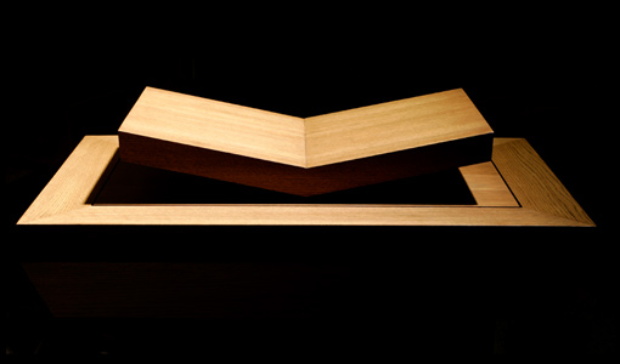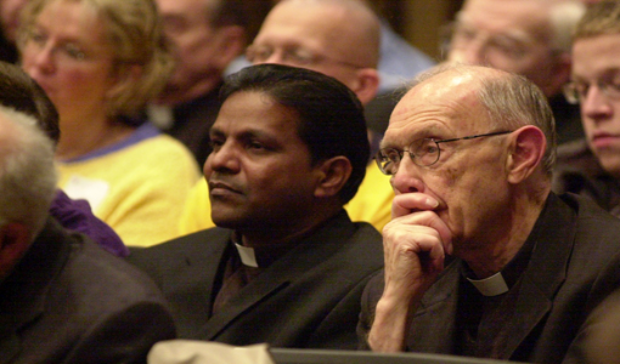John Paul II once told his best biographer that those who try to write the story of his life “try to understand me from outside. But I can only be understood from inside.”1 It is possible to see in the assertion an assessment of the general state of historical writing, and of its failure or inability to take into account the full complexity and dignity of the human person. The failure of historians, both in the papal case and more generally, might well be summarized as an inability to take seriously, or perhaps even to note the existence of, the relationship between their human subjects and God. Put another way, historians appear to be unable to contend with piety.
It seems curious that in the great proliferation of historical specializations and subspecializations, one has great difficulty in finding any that might be said to be concerned with the history of piety. It is even more curious that this lack is as strikingly an affliction of Catholic historiography as of any other. But there is a glorious exception to this rule in a series of monumental volumes titled Archivio Italiano per la Storia della Pietà, a series distinguished by the beauty of its page and the rich erudition of its contents and entirely dedicated to the collection of materials for the history of piety. The Archivio was the lifelong ambition of Don Giuseppe De Luca. That, in the absence of institutional support and academic connections, the Archivio has continued for 40 years after Don Giuseppe’s death, is eloquent testimony to the attractiveness of the man and the soundness of his view that the pursuit of the history of piety is a pressing requirement of the human spirit.
Don Giuseppe De Luca was born in 1898 in a very small town of innermost Lucania. Like several of his uncles, he discovered in himself a vocation to the priesthood and entered the seminary. At the conclusion of his training in Roman seminaries, he found that the troublesome social and cultural activism of his priest-uncles made his bishop reluctantto ordain another member of the clan. Fortunately, despite the doubts engendered in some of his superiors by the excessively curious readings in which he was engaging, he found sufficient support in Rome to obtain ordination for that city on Oct. 30, 1921.
For several years he was the scrupulous chaplain of a house for the aged, but he was never involved in parish life. As he frequently would say, he became instead a “stray dog,” a man without roots, who did not quite belong anywhere. But this state of rootlessness became for him a priestly ideal, a necessary condition for the priest to become the heir of the whole tradition of the Roman Church, without being conditionedby other attachments. It also gave him some hope that he might try to belong everywhere, particularly “in partibus infidelium,” that is, among those many people who, for one reason or another, had found the Church hard to take.
As much as he might rejoice at the sight of any of his friends returning to, or discovering, the Church, it never was his immediate and obvious aim to bring this about. This is remembered most dramatically by the writer Giuseppe Prezzolini, with whom De Luca remained in correspondence for decades, and who described their exchanges in these terms:
It is a curious correspondence between a Catholic priest, who moreover loved to term himself ‘Roman,’ and a complete and absolute unbeliever; in it, there is not a single attempt by the priest to convert the sinner, and there is not on the part of the sinner any kind of derision or offense toward religion. The two have esteem and respect for each other; they love each other. Their points of view are different, antagonistic. ... The most delicate link in this union of contraries occurs when my son Alessandro is about to die, and the priest asks the unbeliever to have religious comforts offered to his dying son; and the father explains to the priest why he cannot and must not do it. The episode leaves no hint of a break. Each has spoken according to his conscience. Each has done his duty. Each can face the other friend with honour, perhaps more than if there had been movement from the one side or the other toward a silence or a compromise.
If one can call his relations with those outside the Church in some way instrumental, then, it is not in the sense that he wanted to cultivate them in order to reel them in, but that he wanted to know them for the purpose of understanding why such people, whom he liked and enjoyed so much, thought they could do without God and the Church. It was an early conclusion of the young De Luca that much of the trouble lay in the fact that, both in the Church and out of it, reflection on religious experience tended to focus on inessentials and to neglect the fundamental dimension of human existence, namely the relationship of love or hate, piety or impiety, between the person and God. And so he dedicated himself very early to the task of writing the history of Italian piety. If what he really had in mind was a book, it was a task in which he was destined to fail. But he failed productively, even gloriously.
After setting out his description of piety, De Luca proceeds to ponder why its history has not yet been written. He points out, in the first place, the relative triumph of history, if it may be so called, since history has been left on the scene as the only discipline of the spirit to face and counter those “naturalistic disciplines which have reduced the human person half to zoology and half to experimental psychology.”
We see that De Luca’s indictment of historians is heavy: it is his view that much, even most, of modern historiography has been tainted by the historians’ desire to be on the right side of power, to be relevant, to do politics. When they do so, they are not impressively effective politicians, but more serious is the fact that they become lousy historians. This is so because they define their task not in ways that allow the fullest understanding of the people whom they study, but with an eye on how their studies appear to the dominant powers in their societies. In an even meaner, and perhaps more pernicious way, academic historians tend to worry too much about the way in which their work will advance their careers, and how the various dispensers of the several kinds of respectability and patronage will assess it. This kind of cravenness does not make for the breadth of spirit and intelligence that the pursuit of the history of piety requires.
If this has been the course of historical scholarship, then we begin to see why piety has not yet become a subject of historical investigation, not even among the historians of religion, or even among historians of Catholic things. Church history itself has been the history of churches, popes, bishops, the great orders, but not of their piety. Even the history of theology or of heresy has neglected “the history of that which is the soul and force of every movement of thought, namely the breath of piety; when this breath ceased, so also did the movement.”
This list of possibilities and failures leads De Luca to ponder once more the cause for such deficiencies. Perhaps not surprisingly, the fault is found to be moral and to consist in pride:
Our pride is great, and we are not for this reason any less small. Fearlessly, we continue to do history as if the people who preceded us, all of them, lived for no other end than to produce us. ... With the boldness and arrogance of children, we catalogue flowerings and harvests of people ... under the marks and labels of our very relative knowledge and, alas, of our condition and of our measure and misery. We are not able to look with respect at those who have gone before us and think that, perhaps, not only in poetry, but also in thought, they had reached a perfect life, more perfect than ours. The history of piety is able, like few other histories, to teach us such modesty, which is no more than elementary honesty and plain intelligence.







